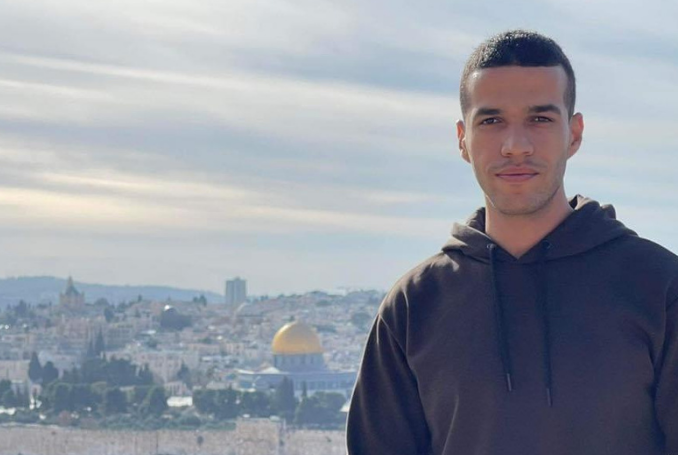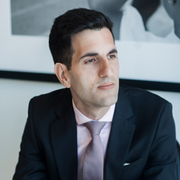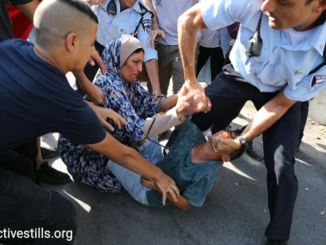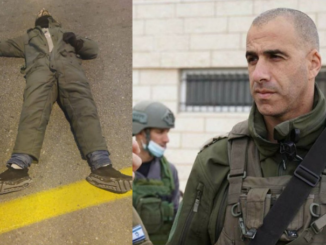
In a recent Al Jazeera story on Abdullah Al-Husari, a young Palestinian man killed by Israeli forces, his friend described him thus:
“He was always with me…. I used to try and convince him to stay safe. All of his friends became martyrs. He was sick of this life.”
I was hit by tremendous sadness when I heard this. But also indignation. It occurred to me that not only is Israel attempting to dispossess Palestinians of everything. They are, through the brutal occupation of their homeland, trying to wholly demoralize them. Not simply so they become complacent and fear challenging Israeli violence. But to cause them despair. This is echoed by Raji Sourani, a human rights lawyer who spent years in Gaza (cited by Noam Chomsky in ‘On Palestine’):
“The most common sentence I heard when people began to talk about ceasefire: Everybody says it’s better for all of us to die… We have no dignity, no pride; we are just soft targets, and we are very cheap. Either this situation really improves or it is better to just die. I am talking about intellectuals, academics, ordinary people: Everybody is saying that.”
I hesitate to call this “tragedy”, though—in so far as immense and unnecessary suffering is involved—it is that. The term too often is used to convey things that happen accidentally (a good person who falls asleep at the wheel of a car and dies, as a result, is a tragedy). However, the suffering in question is deliberate, the perpetrator of course being Israel.
We need to take this seriously for many reasons. Let’s start with one. When people are pushed to the point of despair, especially in the knowledge that it’s on account of injustice (in this case the occupation), they become violent. If not immediately, eventually. The notion that one, including in such a situation, can always do otherwise smacks of bourgeoisie idealism. A naive existentialist who believes in the irreducibility of “freedom” might say that but it in no way squares with material reality. It is indeed more a wish, akin to magical thinking, than what is happening outside the head.
Martyrdom for the Palestinian young person represents hope (this is no doubt troubling but I’m speaking here at a phenomenological level, namely how and what is perceived not whether it is an ideal goal to have). By means of it, he believes that he can liberate himself and fellow Palestinians from further Israeli oppression, even if it costs him his own life. This, as well as the honor he anticipates it will bring him, is enough to mobilize him. It lifts him out of despair and prompts him to take action, however dangerous, that suddenly gives his life meaning. He feels human, has a reason to live—forging a possible future for the Palestinian people.
Italian philosopher Giacomo Leopardi:
“A young person with neither a present nor a future, that is, without means, occupation, pleasures, life, etc., and no hopes or prospects for the future, must be very unhappy and desperate, lack life altogether, and be appalled and afraid for his fate and future. A young person does not have a past. What little he has serves only to sadden him and make his heartache.”
Leopardi, though writing in early 19th century Italy, captures the experience of many young Palestinians today. Not only, given the relatively short time they’ve been on earth, do they have little from the past to draw and from which they may derive some consolation. That which they do have is characterized by trauma: memories of horrifying events, brought about by relentless Israeli brutality. In this way, they are stuck in a “nowhere” place. They see no meaningful future for themselves. Pushed to the extreme they are left with only two options: kill themselves or other people.
This is by no means a state of affairs we should ever wish on the world. Killing is inherently evil. It undermines love, community, and the bonds that—at a basic and spiritual level—unite all. But because killing is wrong does not mean that people won’t do it, see it still as having some kind of instrumental value—whether personal (e.g. to redeem oneself) or political (e.g. to redeem one’s people).
This is precisely why people commit what they know to be “necessary evil.” It causes suffering such as the death of innocent civilians but at a certain point, namely desperation, that fails to trump or be a reason against preserving what has incorruptible value. For the Palestinian martyr that is, quite simply, Palestine. Its existence (as a nation, culture, way of being in the world, etc.) is non-negotiable. Likewise the more its existence is threatened, let alone in the absence of adequate intervention from the international community, the likelier is the martyr to actually become violent.
Can we move towards a world, a better one, where being a martyr is no longer necessary? Not until there is justice for the Palestinian people. Unlike previous attempts, such as the Oslo Accords, this must put front and center the right to self-determination by Palestinians themselves (a “scary” prospect for those who don’t respect their autonomy and would rather see Palestinians universally oppressed), as well as the implementation of strong legal and other mechanisms to ensure the right is protected.
If that obtains then Palestinians, as should have happened a long time ago, will not be forced to live further under the heel of Israelis. Aside from being in denial of the insufferable settler-colonial regime, they are not taking seriously what it’s doing to Palestinians—as human beings—themselves.
Without that recognition, violence will sadly continue. And I say sadly not because Palestinians don’t have a right to resist but because they shouldn’t be in and genocidal situation where they have to. They are entitled to a dignified life of freedom, where despair—brought about by oppressive rule—does not force youth to kill.
This is not a law set in stone. The despair, symptomatic of repressive Israeli rule and not some mysterious cause, can be eliminated. Specifically, that involves ending and not simply mitigating the harms of the occupation. Violence will continue so long as Israel—guided by racist ideology—continues to manage Palestinians as a “terrorist threat”, demeaning them in every walk of life. Israelis can of course be allies here but, in keeping with the international community in solidarity with Palestine, they cannot simultaneously serve as apologists for the Israeli state.
You are either for or against the liberation of Palestine. “Neutrality”, at best, amounts to inaction and so you are in effect supporting the occupation. Conversely ending the occupation is based on and eventually results from action, aimed at dismantling everything—from unjust laws and court systems to checkpoints and settlement developments—keeping it alive. You can be part of that whatever your religion. We cannot buy into the lie that Israel is selling that if you are “Jewish” you shouldn’t. There’s nothing Jewish about favoring oppression and the mere suggestion of that is antisemitism, something Israel will never admit.
No one desires blood where there is peace. It is essential however that we recognize that this, not only for Palestinians but all of us, means first being free from constant brutality and oppression. Such conditions force people to kill. And no young person should ever experience that.

– Paul Salvatori is a Toronto-based journalist, community worker and artist. Much of his work on Palestine involves public education, such as through his recently created interview series, “Palestine in Perspective” (The Dark Room Podcast), where he speaks with writers, scholars and activists. He contributed this article to The Palestine Chronicle.








